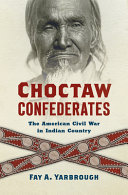Moving beyond dichotomies of North and South or free and enslaved, Yarbrough (history, Rice Univ.;
Race and the Cherokee Nation) focuses on the Choctaw people’s experiences during the American Civil War. Expelled from their traditional homelands in the present-day states of Alabama and Mississippi, along the Trail of Tears, the Choctaw settled in Indian Territory bordering Texas and Arkansas. Yarbrough writes that like their white neighbors to the south, the Choctaw used the labor of Black enslaved people, primarily for growing corn and grain and herding animals; cotton formed a small portion of Choctaw agricultural output. When the Civil War began, the Choctaw nation quickly sided with the Confederacy. Choctaw men thronged to specially formed units in the Confederate Army, displaying, Yarbrough claims, a degree of enthusiasm often lacking in white Southern recruits; she makes the case that participation in the Civil War was a means for Choctaw men to reclaim older conceptions of manliness rooted in warfare. After the war’s end, Reconstruction forced Choctaws to reconsider tribal membership and citizenship, Yarbrough maintains. In this cogent work, drawing on narratives of enslaved people, the records of Choctaw recruits to the Confederate Army, and government and archival sources, Yarbrough gives a more complete look at Choctaw experiences of and perspectives on the Civil War and its effects on their society and culture.
VERDICT Readers interested in history of Indigenous peoples and the U.S. Civil War will enjoy this look at the Confederacy through the lens of Choctaw people.




Comment Policy:
Comment should not be empty !!!